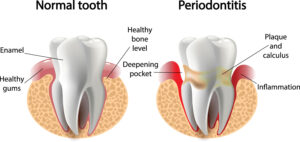We have many people who have been in our
“patient family” throughout our 25 years of dental practice. It’s been a pleasure to care for these smiles; particularly those who began as teens or young adults and now have children of their own (
who are now patients, too!).

As people age, so do their dental needs. A teen may need early guidance in the alignment of teeth or extraction of wisdom teeth. A young adult may require repair of a cavity or care for gum sensitivity. A middle-aged or senior adult may need
crowns to protect fractured teeth or replacement of teeth that have been lost.
There are dental challenges for all people throughout every stage of life. However, females, due to the varying hormonal changes they experience, have additional challenges. At different ages, females have increased oral tissue sensitivity because of hormonal changes. These changes affect the blood supply to the gums as well as the body’s ability to combat toxins that occur from plaque build-up.
Plaque is the sticky film that coats the teeth and gums. This is actually a layer of oral bacteria. Before brushing, you can feel it when you wake up in the morning and smell it by having “morning breath.” Certainly, both men and women are susceptible to the development of plaque. Yet, at different ages, females have more sensitivity when it comes to oral health.
One main reason has to do with female hormones. During various stages of life, hormonal changes can make women more susceptible to
gum disease. For example, during pregnancy with increased blood flow, pregnant women can easily develop pregnancy gingivitis. This can cause increased gum sensitivity, swelling, redness and bleeding when brushing. Gingivitis is the initial stage of gum disease.
While pregnancy can be problematic to oral health, some of the greatest challenges females face in life are during menopause and post-menopause. These phases of a females’ life can lead to changes such as dry mouth, aching and burning sensations in gum tissues, altered taste, and frequent bad breath.
Gum disease (or
periodontal disease) causes the gum tissues to become inflamed. The more severe stage, periodontitis, causes the diseased and infected gums to pull away from the teeth, leaving open spaces that fill with infection (known as pus pockets). These inflammatory bacteria are so potent they can break down the bone and connective tissues that hold teeth in place.

If periodontitis goes untreated, the teeth can loosen and may require removal. It is the nation’s leading cause of adult tooth loss.
These bacteria aren’t necessarily confined to the mouth. The infectious bacteria have been found to activate or worsen the development of other diseases in the body, including heart disease, stroke, arthritis and diabetes. Past research has found links between gum disease and oral, esophageal, head and neck, pancreatic, and lung cancer. This prompted researchers to look for links between gum disease and breast cancer.
A 2015 study found that postmenopausal women with gum disease were more likely to develop breast cancer than postmenopausal women who didn’t have gum disease. The study also found an even higher risk of breast cancer in women with gum disease and a history of smoking.
(Study published by the journal Cancer Epidemiology, Biomarkers & Prevention: “Periodontal Disease and Breast Cancer: Prospective Cohort Study of Postmenopausal Women.”)
The research was part of a larger study that included nearly 74,000 post-menopausal females who had never been diagnosed with breast cancer. About 26 percent of the participants revealed the presence of gum disease. After 6 years, findings showed a 14 percent higher risk of breast cancer in women who had gum disease compared to those who did not have gum disease.
According to the Centers for Disease Control & Prevention (CDC), 68 percent of adults age 65 and older have gum disease. A contributing factor, for women in particular, is due to having a dry mouth. As estrogen and progesterone levels decline, it can affect saliva production.
Having a dry mouth means there is less saliva to rinse bacteria and food particles from the mouth. This natural rinsing agent also helps to keep your gums from receding. Thus, lower levels of saliva increases the risk of tooth decay, gum disease and bad breath.
Another challenge of menopause is osteoporosis, which increases after menopause. The estrogen hormone that protects your bones drops significantly with menopause. Osteoporosis makes you three times more likely to experience tooth loss, and bone loss in your jaw increases your risk of gum disease.
While the aging process creates more challenges, certain steps can help you to avoid or minimize health problems that are largely avoidable. Cavities and gum disease are among those. First, know the signs of gum disease, which include:
• Red or swollen gums
• Gums that may bleed when brushing teeth
• Persistent bad breath or unpleasant taste in the mouth
• Gums that pull away from the base of teeth
• Sensitive teeth
• Loose teeth
Your six-month
dental exams and cleanings are structured to help you achieve and maintain a healthy smile. These visits allow our hygienists to remove hardened plaque on teeth (tartar) and catch small problems while they’re still small.

Your at-home care is very important. Brushing at least twice a day (at least two minutes each time), daily flossing and limiting sugar are helpful in managing bacterial levels in the mouth. Also, drink plenty of water throughout the day to keep the mouth moist. Limit coffee, tea and colas. This is because caffeine is very drying to oral tissues, as is alcohol. If you smoke (whether cigarettes or vaping), you’ll need added measures to keep a healthy smile. Our
dental hygienists will gladly offer tips to minimize the damage of nicotine.
As a Macomb and Oakland County
dentist, I can assure you that our goal is to help patients
avoid the need for dental repairs and procedures – at any age. Our
Shelby Township dental office is always happy to welcome new patients. We offer complete dental services, advanced skills and
technology, and comfort options including Oral and I.V.
Sedation (
“twilight sleep”).



